Knowledge, Skills and Attitudes
There are two ways you can gather performance data on the KSAs of your team members. Firstly, by recording details of significant incidents that involve the individual; and secondly, by observing the behaviors they display as often as possible and in as many different settings as possible.
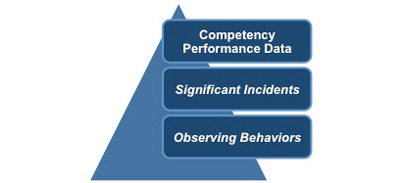 |
To understand how to gather all aspects of performance data for both goals and competencies you should read our free eBook 'Evaluating Performance'.
You should analyze the report data that each team member submits to you. This information, along with each person's SMART goals, enables you to have a defined expectation of what is required, what needs to be done, and what constitutes the successful completion of a task.
An incident becomes 'significant' when a team member's performance deviates substantially from that specified in the role description or from your own expectations. These incidents can be positive or negative, and even though infrequent, they can provide you with evidence of how well the individual's behaviors match those expected in their role. You can use our Significant Incident Template to help you to monitor and record these specific events in sufficient detail to enable you to have evidence based data to discuss with the individual in your regular reviews or the appraisal.
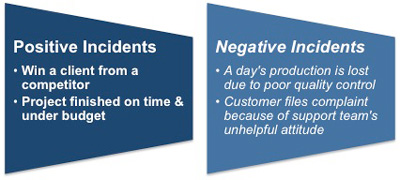 |
Day-to-day observations can also provide a source of performance data and you should make it a regular habit to observe and note each team member's daily interactions with others as they perform their tasks. You can then use these notes to decide whether or not it meets expected performance levels.
Positive behaviors include things like a team member going out of their way to help another team member, or voluntarily taking on additional responsibility. Negative behaviors include things like an individual claiming credit for another's work or withholding information so that others cannot perform tasks properly.
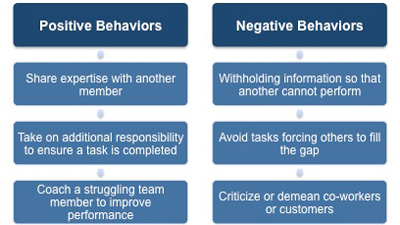 |
The following example will help to illustrate how you would go about this process of gathering performance data. Imagine that you manage a sales team responsible for selling computer hardware support contracts. Each salesperson deals directly with senior levels of high-value corporate customers and is allowed a significant amount of autonomy in these dealings.
You are walking through the office and hear John, one of your team members, having a phone conversation with a customer whose main server has crashed, causing them significant operating problems. From what you hear you become aware that John has received the call because the customer has not had an immediate response from the Customer Services Hotline, which is a critical part of their maintenance contract.
It is obvious that the customer is extremely unhappy and is insisting that John arranges to have an engineer sent out immediately so that their service and business operations can be resumed. In this example, in broad terms John would be expected to have the following KSAs. The extent of his depth of knowledge would be outlined in his role description:
• Knowledge of the organization's support policies.
• An understanding of the cost implications to the organization if the support service is compromised.
• An awareness of the support limits available in times of crisis.
• An understanding of how support contracts are constructed.
You can measure the behaviors John displays in this situation using the KSAs to illustrate his level of competency as per the role's requirements.
John's Knowledge
Your first questions would be: Are the customer's expectations reasonable? How is an immediate response of the Customer Services Hotline defined? Is it a response within 15 minutes or an hour?
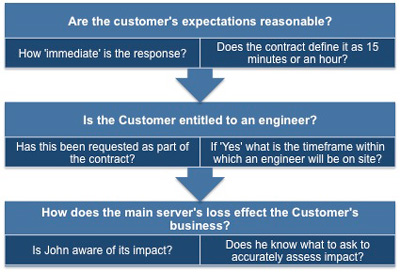 |
Is John familiar with the contract so that he knows exactly what service response the customer is entitled to? Also, can he demonstrate that he understands how this problem impacts the customer's business and can he recommend other courses of action that could help resolve things in a more satisfactory manner?
It is these types of factual questions that will demonstrate the extent of John's knowledge.
John's Skills
The main element you want to see displayed here is John's verbal communication skills. These include how well he is able to persuade the customer to calm down and how quickly he is able to judge the impact on your organization.
Can he exhibit sufficient levels of empathy to win the customer over and work with him or her to resolve the problem? John's success in this area will depend on his skill in teasing out the true cause of the crash, as this may impact on the type of support the customer is entitled to.
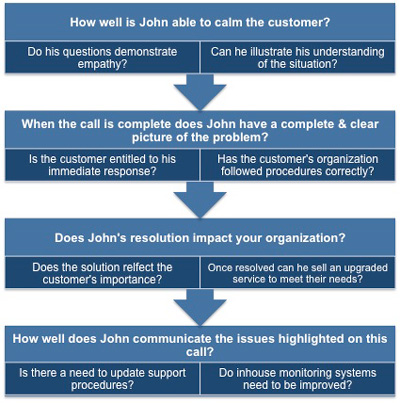 |
You will also be able to assess John's skill at judging the repercussions this support incident has had on your organization and whether this needs to be fed back to technical support or possibly senior management.
John's Attitude
The attitude John displays during the call will also be an important factor in determining how well this support issue is resolved, irrespective of whether or not the customer's contract entitles them to an immediate response.
During the conversation do you hear John promising things that will be costly to deliver or even impossible? Do you observe that while he may suggest potential solutions to illustrate to the customer he understands the importance of the problem it is with the caveat that he needs to check with the technicians to ensure that they are practical solutions?
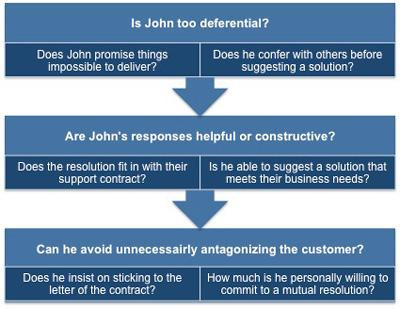 |
You would also want to observe that through the conversation his questions illustrate that he is gaining an appreciation of what would help the customer's business needs the most. In addition, you would want to see that the final resolution fits as closely to their contract as possible.
You would also be mindful of any attitudes he displays that may antagonize the customer. This may result, for example, from his pedantically repeating the details of the contract. Outside of the conversation you would want to observe how much his behavior reflects his personal commitment to finding a resolution that leaves both parties happy.
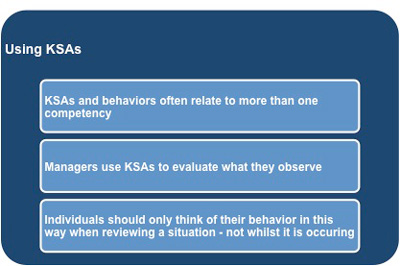 |
By using KSAs to evaluate the behaviors John displays during this exchange, your assessment of his competencies will be both objective and evidence based. When measuring competencies by their aggregate behaviors you need to be aware of the following:
Firstly, that the KSAs John displayed in this interaction may relate to more than one competency. For example, John's behaviors relate to both 'Customer Focus' and 'Interpersonal Communication' competencies.
Secondly, KSAs are what you as a manager should be conscious of observing. They are not what John should be consciously focusing on when resolving the customer's crashed server.
Thirdly, during your regular reviews with John you will discuss how well he handled this incident in terms of his KSAs. This may be especially important if he has a particular goal to develop the competencies of 'Customer Focus' and 'Interpersonal Communication.'
This example with John illustrates how you as a manager can monitor and measure your team members' competencies through their display of KSAs in their day-to-day working against those required and detailed in the role description.
You may also be interested in:
Competency Development Process | Competency Framework Example | Example Competency Framework | Measure Competencies | Developing Competencies at Work.



